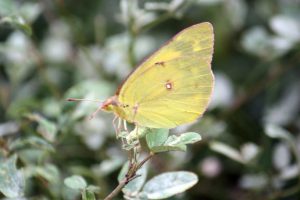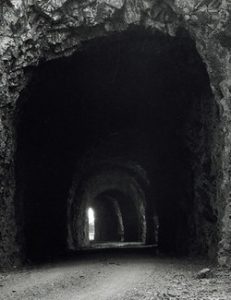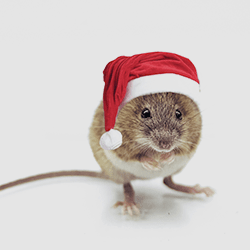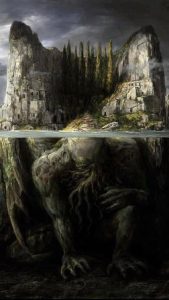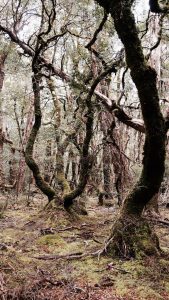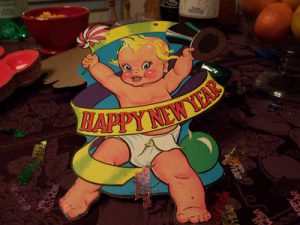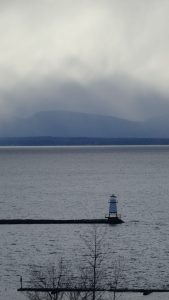All parts of this story are consolidated on one page here.
The old stone classroom felt hot and stifling on this sunny May morning, although it had been built into the earth of the hillside and had three spacious windows just above ground level. The still air almost had Ina dozing off where she sat, trying her best to look interested during another of Petra’s interminable lectures on the ethics of witchcraft. Leaves outside the nearest window swayed slightly in the faintest of breezes. A common yellow butterfly rested on the tip of a branch, fanning its wings. Ina would have liked a fan, too…
(Creative Commons image via flickr)
“Pay attention!” Petra thundered, pounding the podium.
Ina flinched, wondering if she had gotten herself in trouble for letting the butterfly distract her. After a moment, however, it became clear that the exhortation was simply part of the lecture and was not directed to anyone in particular.
“We must always be vigilant—always!—lest we stray from the path of service. We face many choices every day. Some are trivial, some consequential—but in all of them, we must ask ourselves: Are we serving with love or reacting in fear? If we are honest, the answer can be found quickly. The greater challenge is to recognize the need to make a decision soon enough to ask the question.”
Petra paused to wipe her face with a plain homespun handkerchief before she brought the morning’s lecture to its long-awaited conclusion.
“Very soon, your apprenticeship year will come to an end. Then, you will go forth into the world as journeywomen. You must cultivate the habit of asking, in all that you do: Love or fear? Remember, at any time, you may suddenly be put to the test.”
With class dismissed (mercifully, in Ina’s view), it was time for lunch, followed by midday chores. After eating her bread and cheese, Ina walked with Daphne and Phoenix to pick up empty baskets from the storehouse beside the kitchen. They would be gathering dandelion greens and wild strawberries, both of which grew in abundance at the Wild Forest’s edge.
A light wind had started blowing, and the shade under the trees felt comfortable as the girls walked along the path. After a while they came to a meadow dotted brightly with dandelions, which Phoenix began to gather. Ina and Daphne continued walking toward the strawberry patch, not far ahead.
“Do you think Petra meant it seriously when she told us that we’d be put to the test?” That unwelcome idea had just come into Ina’s mind, although she couldn’t have said why. She elaborated on it further as she and Daphne walked around a gentle curve in the path. “And what happens if we fail whatever has been planned for us? Do we get sent away as unworthy?”
Daphne took a few steps into a clearing to the right, where she set down her basket next to a large clump of ripe strawberries. “No, of course not. You’re being much too dramatic, Ina. She meant only what we knew already: unexpected events often happen, and we must be prepared to make decisions wisely.”
When Daphne knelt down and started humming, Ina’s first thought was that she had been dismissed. Almost at once it became clear, however, that the melodic sound had nothing to do with Ina and was directed toward the strawberry plants. The leaves closest to Daphne’s hand lifted up, swinging their plump berries into her palm and gently releasing them. The pitch of the humming changed, as if to express thanks. Daphne put her berries into the basket and moved on to the next plant.
Lacking any such ability to converse with vegetation, Ina started picking berries the old-fashioned way. Pinching the stems between her fingers, she found herself wondering whether harvesting a crop hurt the plant. As she picked the next strawberry, she could almost imagine that she heard the broken stem shouting in agitation.
No, she had in fact heard a shout, not far away—soon followed by another one. The voices came from the path where she and Daphne had been walking earlier. The sound of running feet came from that direction, also. A wild-eyed Phoenix came tearing around the curve at full speed, breathing hard, with her long skirts bunched up in both hands to allow more freedom to run.
The voices were distinct now, very close by.
“The witch went that way! She’s heading for the river!”
A rock came whizzing along the path, narrowly missing Phoenix, and a crowd of villagers burst into view. Ina and Daphne, holding their baskets, crouched behind a stand of low shrubs. Phoenix ran past them, taking a steep descent toward the river at what looked like a very unsafe speed.
“There she is! Kill her now!”
Nellie, the farmwife who had given Ina shelter after her arrival in the Wild Forest, charged to the front of the mob while brandishing a large stick.
Putting a foot wrong on the narrow, stony path, Phoenix stumbled and fell headlong toward the river. She landed with a muffled shriek, and even at this distance Ina could see the unnatural angle of her left leg. Howling in triumph, the villagers rushed forward, waving their sticks—and then there was a gleam of metal as one of them held up a hunting knife.
Overcome by fury, Ina half-rose from her hiding place behind the bushes. Fiery anger pulsed within her. Like a lightning bolt, it was ready to strike. It would char those ignorant villagers to ashes…
“Na, na, na. Ooh, na, na, na.”
Daphne crooned softly beside her, swaying with arms clasped together as if cradling a baby. One elbow brushed Ina’s hand—ever so slightly, but it was enough to ground the roiling power within her nonetheless. A tiny crackle ran along Daphne’s sleeve and dissipated.
Tendrils of moss reached up from the river, wrapping Phoenix in a tight grasp and turning the bright orange fabric of her dress to the same muddy green as the bank where she had fallen. Branches reached down from nearby trees. Ina thought she saw a flicker of motion as the branches lifted Phoenix from the ground, passing her from one tree to another. By the time the villagers reached the riverbank, there was nothing more to be seen.
“She was here! Right here!” Nellie shrieked in frustration, beating the bushes with her stick. A startled rabbit leaped away, and a few small birds took wing.
“She must have used her magic to disappear.” The man who held the hunting knife sheathed it again. “We’ll never find her now.”
Nellie flung her stick at the nearest tree. It bounced into the river, landing with a solid splash.
“I hate those witches worse than anything! They lurk in the forest, working their evil spells and stealing children. Next time I see one sneaking around, I’m going to make sure it’s the last thing she does!”
With shouts of agreement, the villagers began walking back the way they had come. Ina and Daphne stayed motionless behind the bushes until the forest fell silent again.
As they stepped onto the path leading toward the river, a huddled shape came into view under the low branches of a spruce tree. The murky outline slowly regained its original bright colors as the moss that had hidden Phoenix released its grasp.
Ina stopped suddenly, all at once feeling unable to take another step.
“I failed.”
“Whatever do you mean by that?” Daphne glanced back over her shoulder.
“The love or fear test that Petra told us about. I wanted to set those villagers on fire and kill them all. If you hadn’t stopped me, I would have done it.”
“I did nothing, Ina. Your thoughts and choices were your own. I had no way of knowing what was in your mind. When you withheld your power, it was because you made the right decision—without any help from me. Condemning yourself for a stray thought makes no sense, and I don’t want to hear another word of it. Now, let’s go and help Phoenix to get home.”
After delivering this rebuke in an even tone, Daphne turned away and started making her way carefully down the stony slope. Just past her, on the riverbank, the birds that had flown up in alarm only a few minutes earlier were settling back into the bushes. They chirped calmly, as if nothing worth remembering had disturbed their peace.
Ina didn’t find it as easy to forgive herself.

